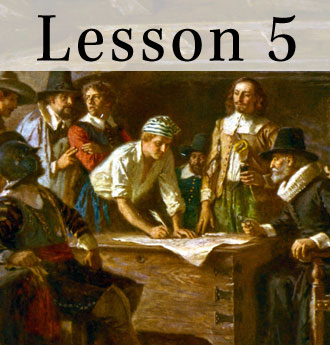Lesson 5: What Basic Ideas about Rights and Constitutional Government Did Colonial Americans Hold?
constituent A person represented by an elected official.
covenant A binding agreement made by two or more persons or parties. In Protestant churches during the Reformation, a covenant was an agreement made in the sight of God. The Mayflower Compact was such a covenant.
indentured servant A person who voluntarily sold his or her labor for a set period of time in return for the cost of passage to the American colonies. Indentured servants provided the most important source of labor in the colonies in the seventeenth century and for a large part of the eighteenth century.
magistrate A lower-level judicial officer, usually elected in urban areas, who handles traffic violations, minor criminal offenses, and civil suits involving small amounts of money. More generally, magistrate means public official.
Mayflower Compact An agreement to form a political body signed on November 21, 1620, by all adult males aboard the Mayflower before the ship landed in Plymouth, Massachusetts. The signers agreed to submit to "just and equal Laws" put into effect under the compact "for the general good of the Colony."
suffrage The right to vote. See franchise






